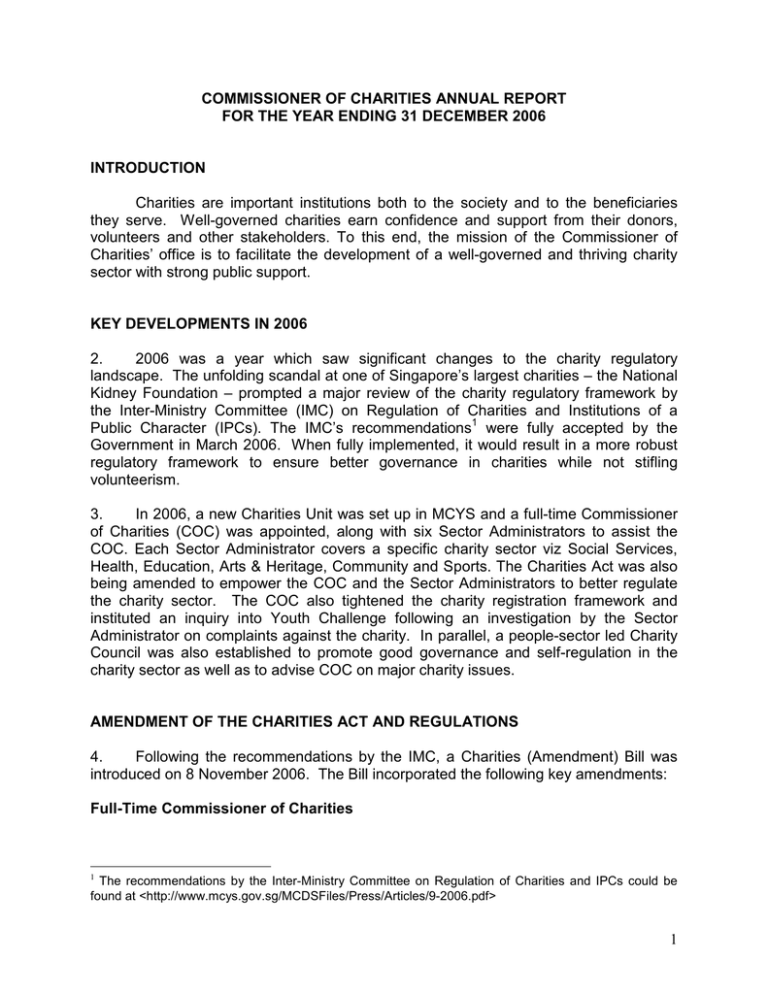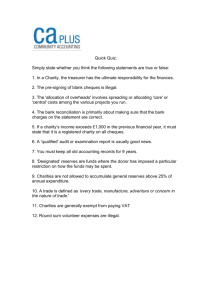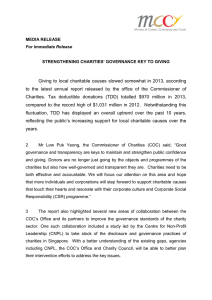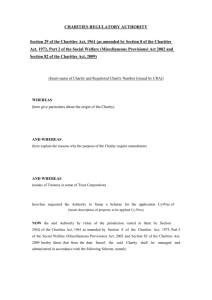COC Annual Report 2006
advertisement

COMMISSIONER OF CHARITIES ANNUAL REPORT FOR THE YEAR ENDING 31 DECEMBER 2006 INTRODUCTION Charities are important institutions both to the society and to the beneficiaries they serve. Well-governed charities earn confidence and support from their donors, volunteers and other stakeholders. To this end, the mission of the Commissioner of Charities’ office is to facilitate the development of a well-governed and thriving charity sector with strong public support. KEY DEVELOPMENTS IN 2006 2. 2006 was a year which saw significant changes to the charity regulatory landscape. The unfolding scandal at one of Singapore’s largest charities – the National Kidney Foundation – prompted a major review of the charity regulatory framework by the Inter-Ministry Committee (IMC) on Regulation of Charities and Institutions of a Public Character (IPCs). The IMC’s recommendations1 were fully accepted by the Government in March 2006. When fully implemented, it would result in a more robust regulatory framework to ensure better governance in charities while not stifling volunteerism. 3. In 2006, a new Charities Unit was set up in MCYS and a full-time Commissioner of Charities (COC) was appointed, along with six Sector Administrators to assist the COC. Each Sector Administrator covers a specific charity sector viz Social Services, Health, Education, Arts & Heritage, Community and Sports. The Charities Act was also being amended to empower the COC and the Sector Administrators to better regulate the charity sector. The COC also tightened the charity registration framework and instituted an inquiry into Youth Challenge following an investigation by the Sector Administrator on complaints against the charity. In parallel, a people-sector led Charity Council was also established to promote good governance and self-regulation in the charity sector as well as to advise COC on major charity issues. AMENDMENT OF THE CHARITIES ACT AND REGULATIONS 4. Following the recommendations by the IMC, a Charities (Amendment) Bill was introduced on 8 November 2006. The Bill incorporated the following key amendments: Full-Time Commissioner of Charities 1 The recommendations by the Inter-Ministry Committee on Regulation of Charities and IPCs could be found at <http://www.mcys.gov.sg/MCDSFiles/Press/Articles/9-2006.pdf> 1 5. With the transfer of the COC’s function from the Inland Revenue Authority of Singapore (IRAS) to the Ministry of Community Development, Youth and Sports (MCYS), a full-time COC was appointed on 1 September 2006. The objectives of the COC are: • Maintaining public trust and confidence in charities; • Promoting compliance by charity trustees with their legal obligations in exercising control and management of the administration of their charities; • Promoting effective use of charitable resources; and • Enhancing the accountability of charities to donors, beneficiaries and the general public. 6. Additional powers have also been granted to the COC so that the COC can act more effectively for the protection of charities and public interest. These include: • Registration and De-registration of charities – Under the former Charities Act, any organisation set up for charitable purposes must apply to register itself as a charity with the COC within three months of the charity’s establishment. The COC cannot refuse registration of organisations set up for exclusively charitable purposes. As this may inadvertently lead to suspect organisations getting registered, the Charities Act was amended such that the COC would be given discretionary power to reject the registration of, or to deregister any charity. • Authority to suspend and prohibit all forms of public fund-raising by the charity or IPC, including fund-raising conducted by commercial third party fund-raisers; • Authority to suspend or remove trustees, employees for a specified time period. This authority extends to removal of these persons from the membership of the charity if necessary; • Authority to give specific directions on the management of the property of the charity or IPC upon its dissolution. Sector Administrators 7. The COC is assisted by six Sector Administrators (SAs) who are in charge of overseeing both the charities and IPCs in their respective sectors. This appointment supersedes the Central Fund Administrator2 system. The six SAs and their sectors are: a. Ministry of Education (MOE) – Education 2 In 1993, the regulation of IPCs was devolved to 11 sectoral agencies i.e. Central Fund Administrators (known as “CFAs”), in recognition that agencies that worked with or provided funding to IPCs in their respective sectors would have the “industry knowledge” to better evaluate IPC applications and assess the effectiveness of the IPCs’ services and programmes. The CFAs were tasked to ensure that the approved IPCs make good use of the tax-deductible donations and maintain records in accordance with the regulations. 2 b. c. d. e. f. Ministry of Health (MOH) – Health Ministry of Information, Communications and the Arts (MICA) – Arts and Heritage National Council of Social Service (NCSS) – Social Services People’s Association (PA) - Community Singapore Sports Council (SSC) – Sports 8. Charities and IPCs that do not fall neatly under any of these SAs are regulated under the COC directly. These typically include religious organisations as well as youth, environmental and animal welfare charities. Charity Council 9. A Charity Council which comprises representatives from the people sector was set up to promote good governance and self-regulation in the charity sector. Mrs Fang Ai Lian, Chairman of Ernst and Young, heads the 14-member Charity Council. Eight members, including the Chairman of the National Volunteer & Philanthropy Centre, are from the people sector and are chosen for their expertise in accountancy, corporate governance, entrepreneurship and law. They are also involved in volunteer and charity work in various fields such as arts and heritage, community, education, health and social services. The remaining members are representatives from each SA. The COC’s office (Charities Unit) provides secretariat support to the Council. The list of members of the Charity Council is at Annex. 10. The Council seeks to help build capabilities by being a/an: a) Promoter – the Charity Council will promote good governance standards and best practices in the charity sector, while the COC will play the role of sector regulator. b) Enabler – the Charity Council will help build the capabilities of the charities and IPCs to enable them to comply with regulatory requirements and to be more accountable to the public. c) Advisor – the Charity Council will also advise the COC on key regulatory issues and significant cases, so that the COC can make more informed and robust decisions. OVERALL STRATEGY 11. The COC’s vision is to develop a well-governed and thriving charity sector with strong public support. In practice, this will require a robust and transparent regulatory framework for charities to comply with and the engagement of charities and the people sector to improve and promote charity governance. As such, the COC has adopted the following strategies: a) Ensure Regulatory Compliance – The Charities Act and its Regulations provide the effective backbone for regulatory oversight of charities and 3 IPCs. Together with the Sector Administrators, the COC works closely with charities and IPCs to advise and ensure compliance. b) Promote Good Governance & Best Practices – Governance in the charity sector refers to the systems and processes concerned with ensuring the overall direction, effectiveness, supervision and accountability of an organisation. By promoting good governance, the COC aims to enhance the overall effectiveness of charities and public confidence in charities. c) Become a Proactive Charity Advisory – A well informed sector is one that is more likely to thrive. Hence information has to be easily accessible to the charities as well as the public to facilitate their works and givings. REGULATORY COMPLIANCE Charities 12. Currently any organisation established for exclusively charitable purposes (other than those exempted) and carries out activities to achieve these purposes must apply for registration with the Commissioner of Charities. We recognise the following four categories of charitable purposes: a) the relief of poverty; b) the advancement of education; c) the advancement of religion; and d) other purposes beneficial to the community which include a. the advancement of health; b. the advancement of citizenship or community development; c. the advancement of arts, heritage or science; d. the advancement of environmental protection or improvement; e. the relief of those in need by reason of youth, age, ill-health, disability, financial hardship or other disadvantages; f. the advancement of animal welfare; and g. the advancement of sport, where the sport advances health through physical skill and exertion. 13. As at 31 December 2006, there were 1,875 registered charities with about half of them being religious organisations. During, eighty new charities were registered and 12 charities were deregistered as they had ceased to exist. As at 31 December 2005, about half of the registered charities had annual income (including donations and Government grants) of less than $250,000. Sixty-four charities had annual income 4 exceeding $10 million. The income received by these charities accounted for 77% of the $4.97 billion of total income of all registered charities. See Chart 1 for the distribution of registered charities by annual income for the year 20053. Table 1: Registered Charities by Charitable Purposes Charitable Purpose Religion Welfare Mixed Health Education Arts Community Others Total Number registered in 2006 Percentage 963 320 195 145 92 81 65 14 1,875 51.4% 17.1% 10.4% 7.7% 4.9% 4.3% 3.5% 0.7% 100.0% Chart 1: Distribution of Registered Charities by Annual Income for the Year 20054 $1,000,000 $10,000,000, 19% $250,001 $1,000,000, 27% above $10,000,000, 4% $0 - $100,000, 30% $100,001 $250,000, 20% 3 This refers to registered charities which had submitted their Year 2005 statements of accounts as at 31 March 2007. 4 This refers to registered charities which had submitted their Year 2005 statements of accounts as at 31 March 2007. 5 14. To ensure only bona fide charities get registered, the COC’s office has also tightened the charity registration framework. More details such as experience in the charity sector, qualifications of the trustees, and the detailed programmes and activities as well as the funding and disbursement plan of the charity have been included into the charity application to inject more rigour in the assessment. Newly registered charities are also monitored more closely to ensure that they are able to comply with the regulatory requirements. Fund-Raising Appeals for Foreign Charitable Purposes 15. The COC’s office also grants permits to organisations that wish to conduct or participate in any fund-raising appeal for foreign charitable purposes. A total of 26 permits were issued in 2006 for various purposes such as humanitarian aid, disaster relief, purchase of medical equipment, support for orphanages and building of schools. Inquiry into Youth Challenge 16. Under the Charities Act, the COC may institute inquiries with regard to charities or a particular charity or class of charities, either generally or for a particular purpose. 17. In May 2006, the National Council of Social Service (NCSS) received complaints alleging possible misuse of funds by the Youth Challenge (YC). As YC was an associate member of NCSS, NCSS proceeded to conduct a preliminary investigation on YC and brought to COC’s attention the areas of concern in YC’s board governance, expenditure pattern and poor internal controls. 18. COC’s office commenced an inquiry into the affairs of YC on 21 August 2006. The Inquiry revealed serious weaknesses and lapses in YC’s corporate governance and management, such as the lack of internal controls and the lack of transparency and misleading information on the Executive President’s remuneration. 19. After the inquiry, the new Management Committee of YC was apprised of the findings. YC was given six months to take remedial actions. UNDERSTANDING AND GROWING THE CHARITY SECTOR Field Visits 20. Field visits are onsite visits by the COC to charities to better understand the charity’s business and to promote good governance and best practices. The COC’s office and SAs conducted 11 field visits to charities and IPCs in 2006. These visits typically involve the charity’s board of trustees who are apprised of good governance and best practices as well as the resources available to help them improve their governance. 6 Governance Reviews 21. Governance reviews seek to assess and help charities and IPCs to improve their standard of corporate governance, financial control and regulatory compliance by identifying their governance gaps and developing action plans to plug the gaps. 22. A total of 17 governance reviews were carried out in the health, education and social services sectors by the Ministry of Health, Ministry of Education and National Council of Social Service respectively. The governance reviews highlighted the need to strengthen roles of the charity boards, implement policies for managing conflicts of interest, give an accurate representation during fund-raising appeals and strengthen the internal controls of the charities. After the review, each charity developed its own action plan to address the gaps identified. Going forward, the COC and SAs will continue to engage the large charities and IPCs from the various sectors in these governance reviews. Initiatives for Year 2007 22. For the year 2007, the COC will be implementing the following initiatives to build capabilities in the charity sector and to facilitate the charities’ work. • Charity Portal – The COC’s office will develop an online portal to facilitate charity registration, IPC application and fund-raising permit application. The portal will also be a resource centre for the public who want to know more about charities in Singapore and for the charities to understand their regulatory obligations. • VWOs-Charities Capability Fund – The VWO Capability Fund (VCF), reserved for VWOs which are members of NCSS, will be extended to the entire charity sector. This will help equip charities and IPCs with the resources to build board expertise, professional management and trained manpower to run their organisations effectively and efficiently. Charities and IPCs can apply to get funding for training and consultancy programmes to build their governance capabilities, train their personnel and also improve their info-communications technology systems. • Code of Governance for Charities and IPCs – The COC’s office will also support the Charity Council in developing the Code which will be a set of principles and standards accepted as the sector’s best practices. The Code will supersede the other existing guidelines to serve as the benchmark on governance standards for the charity sector. The Code will also be tiered to ensure relevance to the different types and sizes of charities. 7 Annex Charity Council Council Chairman: Mrs Fang Ai Lian Chairman Ernst & Young Council Members: People Sector Representatives Associate Professor Mak Yuen Teen Regional Director, Research, Asia Pacific Watson Wyatt Worldwide Mr Tay Poey Cher, David President The Photographic Society of Singapore Mrs Diana Ee-Tan Managing Director, Raffles Hotels & Resorts Executive Vice President, Fairmount Hotels & Resorts, Asia Pacific Mr Suhaimi Salleh Chief Executive Officer SSA Consulting Group Mr Rajaram Ramiah Partner, Wee Ramayah & Partners Mr Tan Hup Foi Chairman, Ngee Ann Polytechnic RADM(Ret) Kwek Siew Jin Chairman, National Volunteer & Philanthropy Centre Representatives from the Sector Administrators Mr Tan Kee Yong Deputy Secretary (Services) Ministry of Education 8 Mr Goh Aik Guan Deputy Secretary Ministry of Health RADM (NS) Sim Gim Guan Deputy Secretary (Info & Corporate Management) Ministry of Information, Communications and the Arts Mr Tan Boon Huat Chief Executive Director People's Association Ms Ang Bee Lian Chief Executive Officer National Council of Social Service Mr Oon Jin Teik Chief Executive Officer Singapore Sports Council 9




